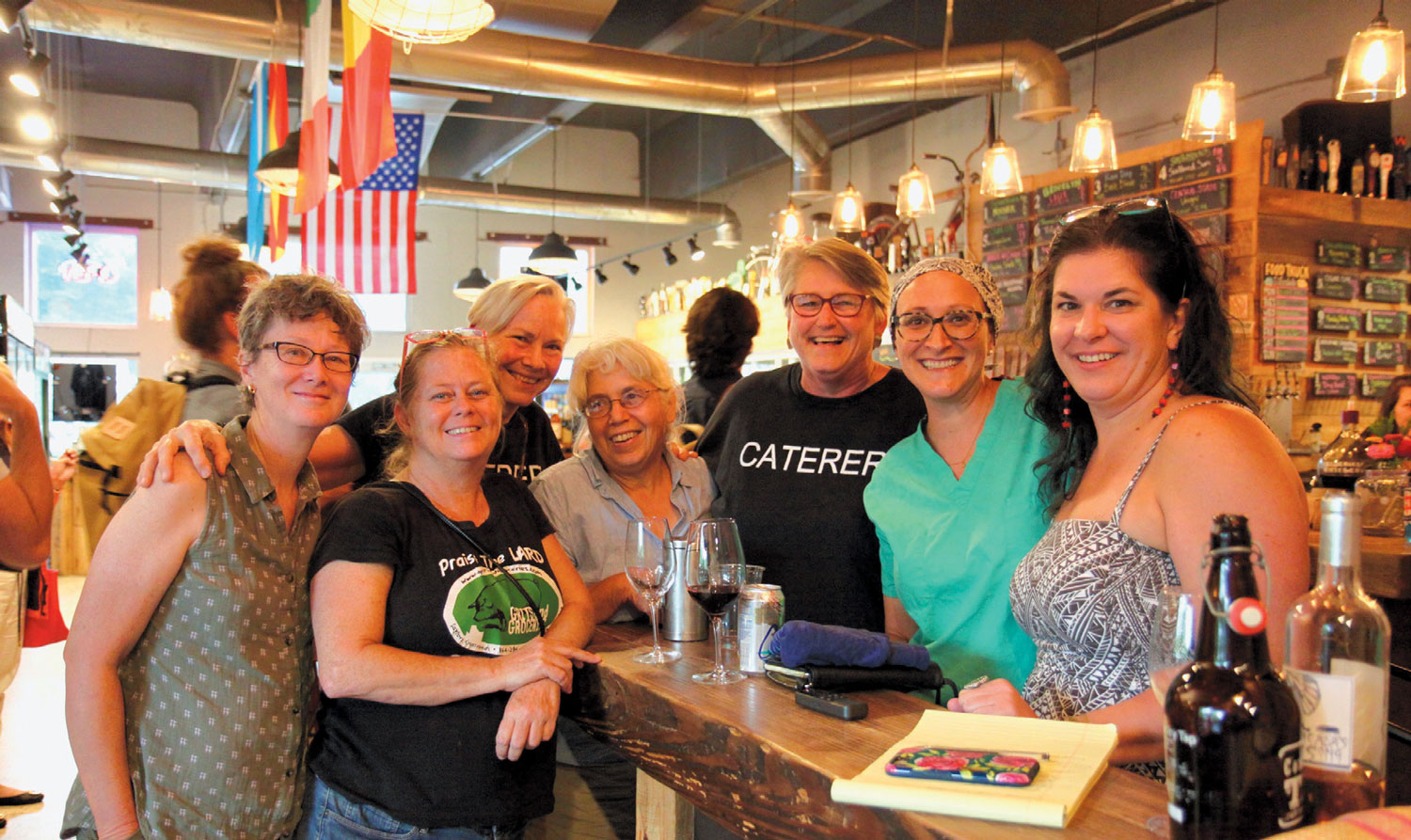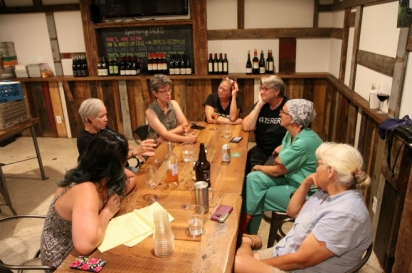A Conversation with Women in Our Food System
edible Upcountry sits down with six female powerhouses to find out what it really means to be a woman in this workforce in 2018.
Six women walk into a bar.
Some of them are wives. Some are cooks, teachers, therapists in hospital scrubs. Some are mothers, some are expecting to be mothers, some are grandmothers. Business owners, holders of day jobs, wearers of many hats—some of them are late. Most of them can drive a tractor and bake a cake.
All of them grow things for a living.
These women represent a cross-section of the many women invested in our local food industry here in the Upstate. While there are certainly aspects of food production, preparation and service that are traditionally women’s work, we’re not talking about garden tomatoes and Sunday suppers anymore. From managing menus to manpower, these women run their own shows.
But this is a very particular time and place. In the light of the #metoo movement, this year has seen celebrity kitchens implode with accusations of misogyny and misconduct. We’ve also seen some 700,000 Latina farmworkers stand in solidarity against sexual harassment in the workplace. Such bombshells got me wondering what the daily work of being a woman in this world was like, particularly here in the Upstate. If these are the negatives, what are the positives? If this is the past, what might the future look like?
In preparation for this conversation, I talked with lots of women about what questions really matter right now—former waitresses and restaurant managers, wine reps and food artisans—which is to say this is a big and diverse community, with a lot of perspectives. The women gathered around the table at The Community Tap were generous enough to offer their time and thinking for this article, and ultimately, their hopes that such conversations are given a regular place to continue.
To begin, I asked how they came to do what they do.
Valerie Lowe and Katie Tillman started Friends Farm and Catering as a restaurant in downtown Anderson 27 years ago. Val says, “I think we did farm-to-fork before we knew what to call it, but it was what we did all along.”
Katie says, “This business has been very good to us. Part of the reason is that it was never about the money. It was about doing the right thing, and doing it for the right reasons, and the money always came. On the reciprocal side of that, you know, the other night at Greenbrier Farms, I said to somebody, how you doing? And she said, you know its good, if I could just pay myself something. You were talking about women being in this industry, and you would never hear a man say that. You would never hear a guy say, I do everything else, and if there’s anything left, I get it.”
It’s the first comment levied at the gender divide, and from the nods around the table, it strikes a chord. But Katie sites responsibility squarely in our laps. “It’s not going to change until we all change. If we don’t sustain us, then there’s nothing sustainable about any of it.”
Val says, “You have to budget yourself into your business plan, what you need to survive. And if the business can’t provide that, find another job.”
Or another slant on the job. The original Friends restaurant quickly added a catering business, because big events buoyed slow time, and front yard gardens became full-fledged farms as farm-to-table menus became a marketable strength. As Val and Katie grew older, the hectic pace of the restaurant was no longer attractive, and they closed it to focus on the farm. They are the model of a smart pivot, of flexibility. I say, “It also sounds like what y’all have done for 25 years is evolve, as opposed to abandon.”
“You’re building something, and that’s a piece of the puzzle,” says Margie Levine, owner and operator of Crescent Farm. “Someone that works with me says, how do you get here before the sun comes up and work until whenever? I’m like, this is my baby.”
Katie says, “You love what you do. And you’re lucky.”
Margie says, “I do love what I do, and I’m very lucky.”
So many of us balance security with love, vocation against avocation, and it’s a particular person who’s able to forego steady paychecks and insurance in exchange for job satisfaction. Why does this so often get equated to parenting? Because that job is selfless, too, and comes without a salary? I begin to wonder if it matters so much that we’re all women here, or if what matters is that we all love what we do.
Crescent Farm is six acres on leased land that’s certified organic, run with the help of Margie’s daughter, son-in-law and family. Leasing is one answer to the expense of farmland, but it also brings a sense of the temporary. “Which is also a terrible model to build your business,” she says, “involving soil and ground on somebody else’s soil and ground. I want to be building a business my kids and my grandkids will continue.”
And maybe that business is not only about tangible things like land. Margie was digging potatoes and discovered a weird pupa. She shows pictures around the table; consensus is she’s got a tomato hornworm, but the coolest part was showing the whole process to her grandchildren. “My whole life,” Margie says, “I’ve used gardens and farms and barns to teach. And to nurture.”
Katie says, “We need to see value in what we’re doing today. Sometimes, if you don’t see value in it, then nobody else is going to see value in it. And then when you go to sell it, you don’t have any value to sell.”
Sarah DuBose is the newest farmer in the group, having just finished her first season of Sassafras Flower Farm, but she’s had the perspective of watching her now-husband George grow Reedy River Farms from one leased acre in downtown Greenville to the several plots they operate today.
“George says this all the time. He’s worked for five years, he’s lost, he’s cried, and he’s dealt with it. Now people want to come and ask him questions. They’re like, hey what kind of compost do you throw on there, and he’s like, I’m not going to tell you my secrets. It took years to create that magic.”
Sarah and George are expecting their first child together, and she still works as a respiratory therapist for Greenville Hospital System two days a week. The question of how to balance the value of her day job against the needs of the farm and her growing family can seem overwhelming.
“We’re so new to this,” she says. “I don’t have the experience, the knowledge of business. We’re just trying to put it in perspective. Where’s our next step? Do I need to quit the hospital? Something’s got to give.” She looks at the other women around her. “It’s very inspiring to be here.”
Heidi Trull slides in, a little late from waiting on the stove repairman at the restaurant. “I was supposed to marry well,” she says, mock wistfully. (To which everybody choruses and you did! Her husband, Joe, is one of the finest pastry chefs around; they met while both working for Emeril Lagasse.) “After being asked to leave the University of South Carolina, I thought, I’ll go to cooking school. There can’t be homework there. And then when I get married, I’ll be a very nice housewife. I’ll throw parties. I can entertain.”
There’s more than a hint of irony to what Heidi’s saying, but also a real sense of her response to the expectations for her generation. She couches her ambitions in a backhanded way.
“I spent five years on a self-appointed apprenticeship and traveled all over the world. I went to restaurants I read about or liked and said, my name is Heidi, I’ll be here for six months, I don’t care if you pay me or not, and I got to work at some fabulous places.” Eventually, she opened her own— Elizabeth’s in New Orleans’ 9th Ward. She says, “I thought, no one will come, I’ll say I tried, and I’ll be a housewife again.” Within the first year, Elizabeth’s earned one of the top ratings in the city.
When she and Joe found themselves parents, the pace of New Orleans lost its charm, and they began to look for opportunities back home, where their son could be closer to family. They’ve run Grits and Groceries out of an historic gas station in the middle of nowhere for nearly thirteen years, and the time has come to move on to other things. Leaning on Joe’s strengths, they’re planning an all-local pie and ice cream venture.
“I have decided that’s the secret to success of a small business,” Heidi says. “A husband with a day job.”
The person with the most day jobs at the table is Rebecca McKinney. She raises young farmers in the Greenville Tech Sustainable Ag program she helped to found, fosters sustainability in the St. Francis hospital system, as well as runs the nonprofit SC Organization for Organic Living.
“Each position brings something for the other,” Rebecca says. Her career trajectory starts with a liberal arts degree and runs all the way to manufacturing systems manager, where she scheduled production and deliveries, supervised a traffic manager, a small fleet of truck drivers and customer service. “When I left, they split my job between three people.”
We’re all laughing at the laundry list, but there’s something about the comprehensiveness of it that’s exactly like what Rebecca does now, looking at farming and sustainability from so many various angles. Also something of the balancing act Sarah describes, between homelife, worklife and farmlife.
“There’s a handful of other people I consider resources,” Katie says. “If I can’t figure something out, I know Rebecca will know where I can go to get what I need. Small businesses can’t succeed without people who do that.”
“I view myself as a connector,” Rebecca says.
“That is a huge, huge thing,” Katie says.
“I know it sounds like I made a huge leap, but I grew up in Ohio,” Rebecca says. “Our backyards always ended in cornfields. My grandmother and grandfather were farmers in Kentucky. Every single family vacation was spent on the farms.”
And those summers inspired something for her. We all have these formative moments, and women in formative roles we’ve modeled ourselves after, our heroes. But there’s also something about the nature of this conversation that’s beginning to chafe.
“This is the year of the women,” Heidi says, “and I love free press, and I don’t want to put that down. But we’ve spent 30 years trying not to be the women in the kitchen and it really kind of pisses me off.”
She sees the pressure building in the industry to have a story, sometimes a tragic or oppressive one, in order to get attention. Sarah calls it tap-dancing.
“People don’t know what to do with people like us anymore, who just work.” Heidi says. “It’s like you can’t be noted for just being good anymore, doing your job, taking care of your customers.”
Rebecca says, “Women a lot of times are running the non-profits that are making the difference. They tend to be more collaborative and less ego-driven, and so we’re out there doing the relationships and really worrying about people. We’re the nurturers, and we don’t have time to get in front of the camera and say, look what I’m doing!”
Heidi says, “And so the unsung heroes are the people who have done something, and do it well.”
“And do it every day,” Katie says.
“For me,” Sarah says, “it’s my crew of friends here in Greenville, women with passion. They’re architects, lawyers, women who’ve started their own businesses. They are badass daily.”
“And they don’t have to do it on Facebook,” says Heidi.
There’s something about the perception of roles in the industry that seems manipulated in this age of social media. Heidi says, “When I’m cooking, making $10 an hour, people say awesome. You’re a chef. When I wait tables, and make $1000 in 30 hours, people say, what happened? Like, poor you.”
Waiting tables—for so many of us, a job we take while we’re doing other things, or waiting for something else to happen. It’s also true that 60% of women will work in the restaurant industry at some point. “Service is so important,” Heidi says. “In every other country, it’s a little more respected than here.”
So how do we draw other women, young women, to this conversation?
“You make it respectful, Heidi says, “and you pay them.”
Rebecca says, “For me, it’s making them feel accepted no matter what their focus or their dream, or who they are. I have people, all the way from ultra-liberal to ultra-conservative, sharing the same space and having conversations. We set the tone. We say everybody respects everybody else. No judgment here.”
Sarah says, “I don’t know how I want to say this, but I fear, with our future girls, I fear there is a fear of work.”
Heidi says, “There is a fear of work.”
Katie says, “And I don’t think it’s just the girls.”
Nor is it just about the millennial generation. Sarah is talking about something deeper: fears of failure, struggle, insecurity, things every thinking person is fearful of, and some of the same difficulties we’ve been talking about here today. How do you manage expectations without falling into the trap of painting chefs and farmers as hipster rockstars?
Sarah says, “It took me until I was 35 to figure out all I want to do is have my hands in the dirt. It’s almost like you have to grow into it, pardon the pun.”
“I never wanted to graduate individual farmers,” Rebecca says. “I wanted a community, where we have each other’s backs.”
“I want to round my people up,” Katie says. “Like a bridge club, for lack of a better word, like a bridge club without bridge. I want my peeps.”
We close the conversation with the thinking it should be regular one, at Heidi’s or Val and Katie’s farm, where women bring their unsung heroes, talk about their challenges, share their secrets. Like Val says, “You get strength from each other.”






